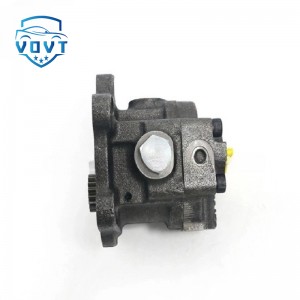Diesel Fuel Injection Pump X4BQA2000/X4BQA85Y014 Engine Auto Engine Part
products description
| Reference Code | X4BQA2000 |
| MOQ | 1 PCS |
| Certification | ISO9001 |
| Place of Origin | China |
| Packaging | Neutral packing |
| Quality Control | 100% tested before shipment |
| Lead time | 7~15 working days |
| Payment | T/T, Western Union, Money Gram, Paypal, Alipay, Wechat |
Investigation on the Influence of Low-Viscosity Eco-Friendly Lubricants on Oil Pump Performance
Abstract:
With the growing demand for energy saving and environmental protection in modern powertrains, low-viscosity eco-friendly lubricants have become an important trend in lubrication technology. However, their reduced viscosity may alter the hydrodynamic lubrication state, internal leakage, and overall efficiency of automotive oil pumps. This study investigates the comprehensive influence of low-viscosity green lubricants on the performance of gear pumps and plunger pumps commonly used in engine and transmission systems.
A combined experimental–numerical approach is applied. First, a thermophysical property database is established for several biodegradable and synthetic low-viscosity oils. These properties are integrated into a CFD-based model to analyze changes in film thickness, shear stress, cavitation tendency, volumetric efficiency, and temperature rise inside the pump. Physical bench tests are then performed to validate the simulation results across different speeds, loads, and temperature ranges.
Results indicate that low-viscosity lubricants significantly reduce viscous drag losses and improve mechanical efficiency at medium and high rotational speeds. However, decreased viscosity leads to increased internal leakage and weaker sealing capability, especially in high-pressure plunger pumps. Under elevated temperatures, some eco-friendly lubricants exhibit improved shear stability but a slight increase in cavitation risk. An optimal viscosity range is proposed to balance energy efficiency and reliability for next-generation pumps.
This study provides a scientific understanding and design guidance for applying low-viscosity green lubricants in advanced engine and transmission systems, supporting both improved efficiency and sustainable development goals.

























